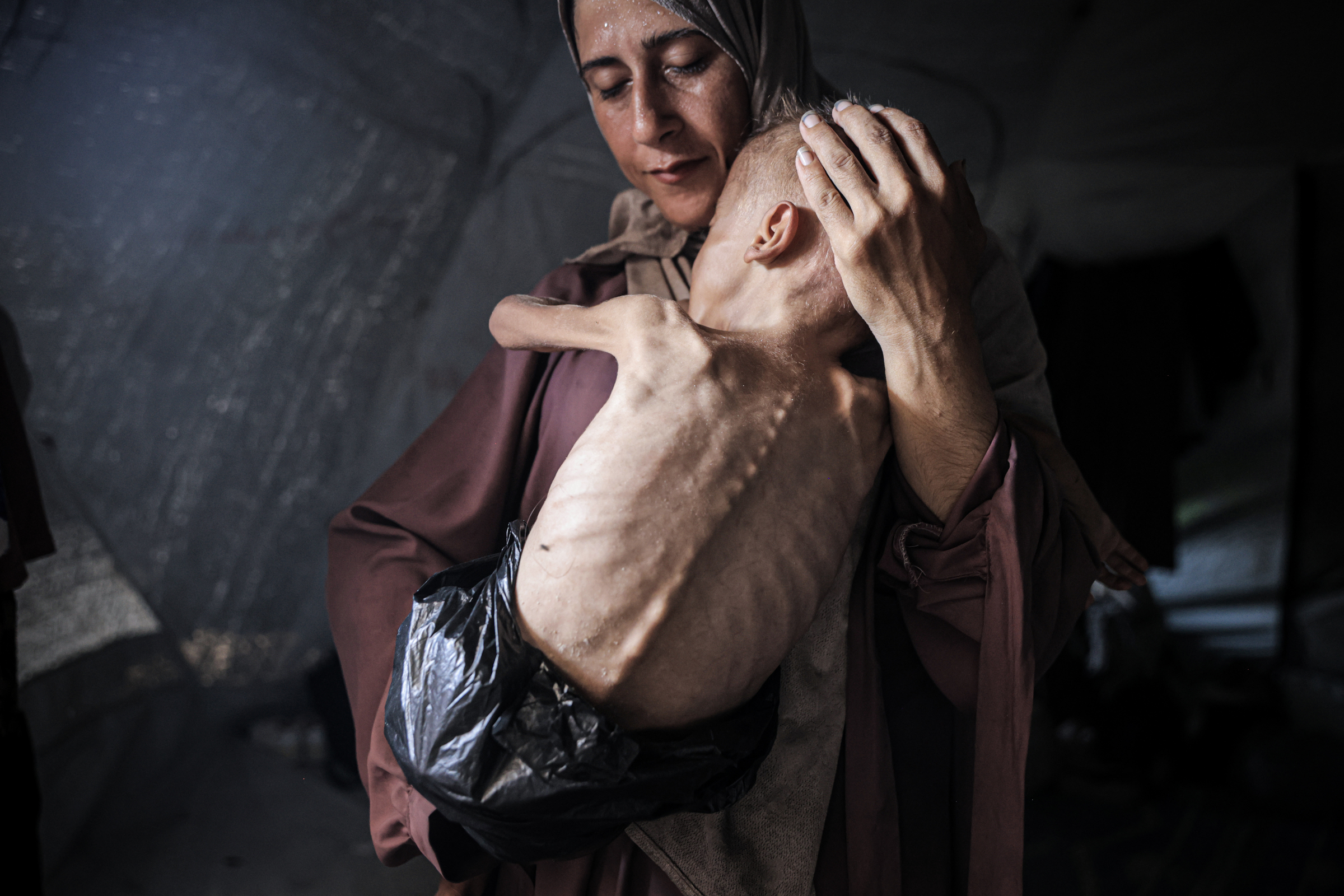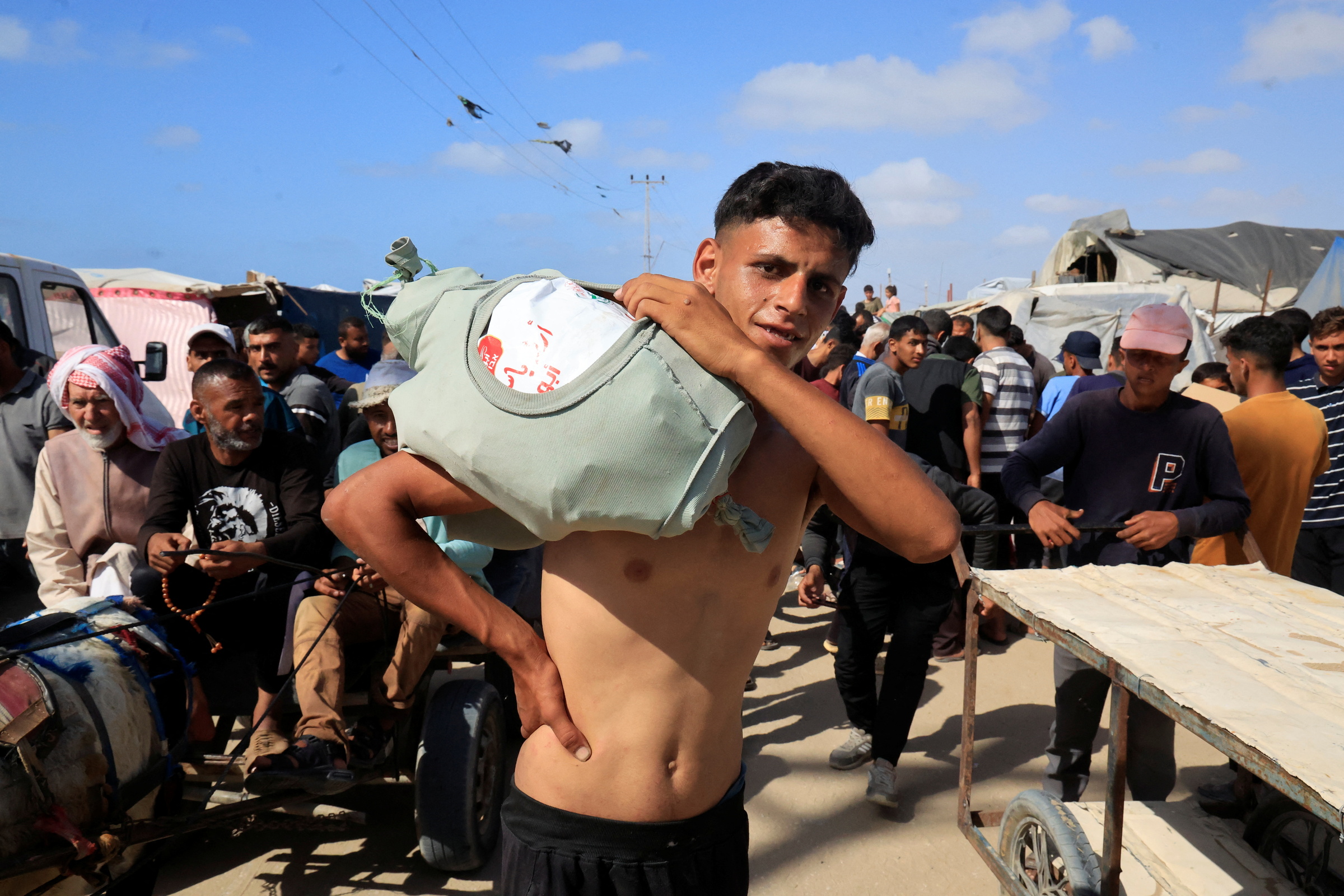"I had to work a 24-hour shift today," a doctor at al-Shifa hospital in Gaza City told the Guardian. "Normally, the hospital provides meals during our shifts, but today they said they ran out of food. My colleagues and I treated 60 patients, and now I can't even stand because I'm so hungry."
Many doctors and medical staff in Gaza share this plight, saying hunger leaves them too weak to care for patients.
"Everyone is exhausted. Some have fainted in the operating room," said Dr. Mohammed Abu Selmia, director of al-Shifa hospital, adding that his staff hadn't eaten in 48 hours.
Data compiled by the United Nations over the past two months reveals a severe hunger crisis in the Gaza Strip, with malnutrition rates rising sharply. Figures from humanitarian organizations and Gaza health authorities also record an unprecedented increase in starvation deaths.
According to a 16/7 report from the United Nations Office for the Coordination of Humanitarian Affairs (OCHA), the number of malnutrition cases treated at a Gaza City clinic run by Doctors Without Borders (MSF) tripled in two months, from 293 cases in May to 983 in July.
"This is the first time we've witnessed malnutrition on such a severe scale in Gaza," an MSF medical coordinator in the region told OCHA.
 |
One-and-a-half-year-old Muhammad Zakariya Ayyoub al-Matouq, severely malnourished, lives with his mother in a tent in Gaza City, 21/7. Photo: Reuters |
One-and-a-half-year-old Muhammad Zakariya Ayyoub al-Matouq, severely malnourished, lives with his mother in a tent in Gaza City, 21/7. Photo: Reuters
A Deir al-Balah resident told the Times of Israel that many Gazans are "going to bed hungry, waking up hungry, and having nothing to eat all day."
Dwindling food aid has caused prices to skyrocket. For over a year, Israel has only allowed humanitarian aid into Gaza through non-governmental organizations, cutting off supplies to private merchants. However, food items still appear on the "black market," believed to be stolen from aid trucks by criminal groups.
"I never thought I'd see a day like this. My family can't even afford breakfast. Vegetables are almost non-existent, and fruits and sugar have been gone for months," the Deir al-Balah resident said. "People here say they'd rather die by bombs than starve. If a bomb hits me, I die once. But with hunger, I feel like I'm dying many times each day."
During a brief ceasefire earlier this year, the number of children treated for malnutrition in Gaza dropped significantly. A UN investigation in March found that monthly cases of childhood malnutrition fell from about 5,000 to 2,500 due to improved food aid.
However, by April, the World Food Programme (WFP) reported that food prices in Gaza had increased by 1,400% compared to prices during the January and February ceasefire. Field sources say actual prices are even higher, despite Israel lifting a two-month ban on humanitarian goods entering Gaza.
"My wife, three children, and I have nothing left to eat. We haven't had any income for two years. My youngest son, Ibrahim, was born during the war, and my wife had to give birth at home. He hasn't tasted a single vegetable or fruit since he was born because we can't afford them," said Anas Arafat, a Gaza City resident.
 |
Palestinians receive aid from the Gaza Humanitarian Fund (GHF) in Rafah, southern Gaza, 27/5. Photo: Reuters |
Palestinians receive aid from the Gaza Humanitarian Fund (GHF) in Rafah, southern Gaza, 27/5. Photo: Reuters
OCHA data shows malnutrition has been rising for months. Clinics in Gaza City and the Al-Mawasi area are treating over 700 pregnant or breastfeeding women and nearly 500 children, all suffering from malnutrition.
The Deir al-Balah resident said he pays 100 shekels for a kilogram of flour (about 13.60 USD), but Arafat said prices in Gaza City are twice as high.
"The same goes for vegetables. Before the war, 100 USD could feed a family for one to two weeks, but now it's not enough for a week. But it's not just about money. Even if you have 100 USD, it's meaningless if there's no flour in the market," Arafat said.
Another resident in western Gaza City said by phone that he "has no choice" but to accept exorbitant market prices for food. "I don't want to risk my life or my children's lives running to aid trucks. What else can I do?" he said.
He said the price of cucumbers can reach 70 shekels per kilogram (about 9.50 USD). Flour prices fluctuate depending on the amount of aid delivered to Gaza by truck.
"If many aid trucks enter and are robbed, the black market price of flour drops. Otherwise, the price rises like the stock market," he explained. "But not everyone can buy. People are robbing because they have nothing to eat."
The Hamas-run health ministry in Gaza reported on 22/7 that 101 people, including 80 children, have died of starvation during more than two years of conflict.
While international organizations and the Gaza Humanitarian Fund (GHF) have continued to distribute aid since the ceasefire collapsed, this food is reportedly not reaching the people.
The UN and Israeli officials continually blame each other for the aid blockage. On 22/7, Israel denied allegations of famine in Gaza, accusing UN-backed organizations of actively receiving and distributing food despite being allowed into the Strip.
Israel's Coordinator of Government Activities in the Territories (COGAT) stated that nearly 1,000 aid trucks had been delivered to Gaza, waiting at the border crossing, but no organizations had come to collect them.
Meanwhile, Muath Alser, director of the Palestinian Healthcare Worker Watch, said doctors in Gaza have recorded unprecedented levels of hunger, weakened immunity, infections, and exhaustion and fainting among medical staff. "We can't just listen to criticisms; we need urgent action," Alser said.
Thanh Danh (Times of Israel, BBC, AP)












